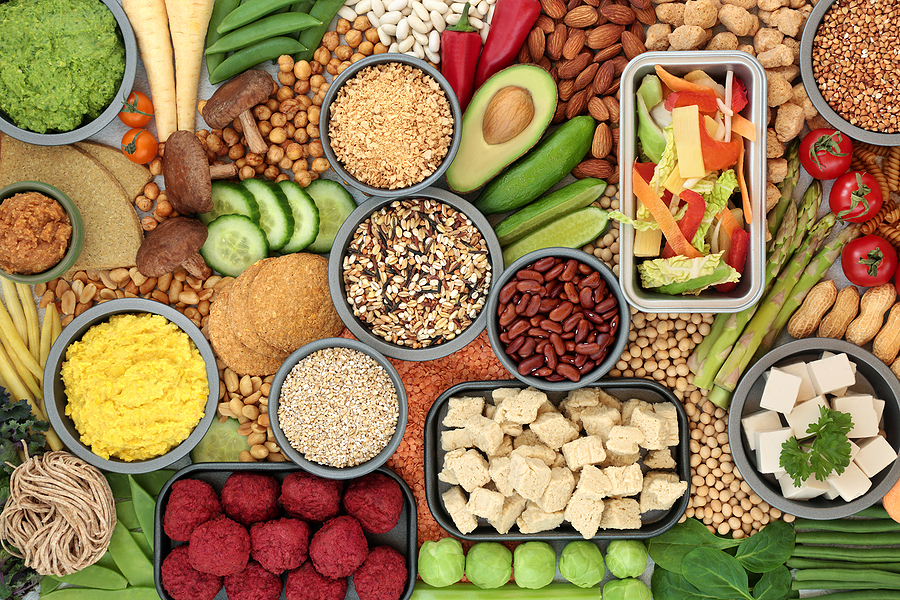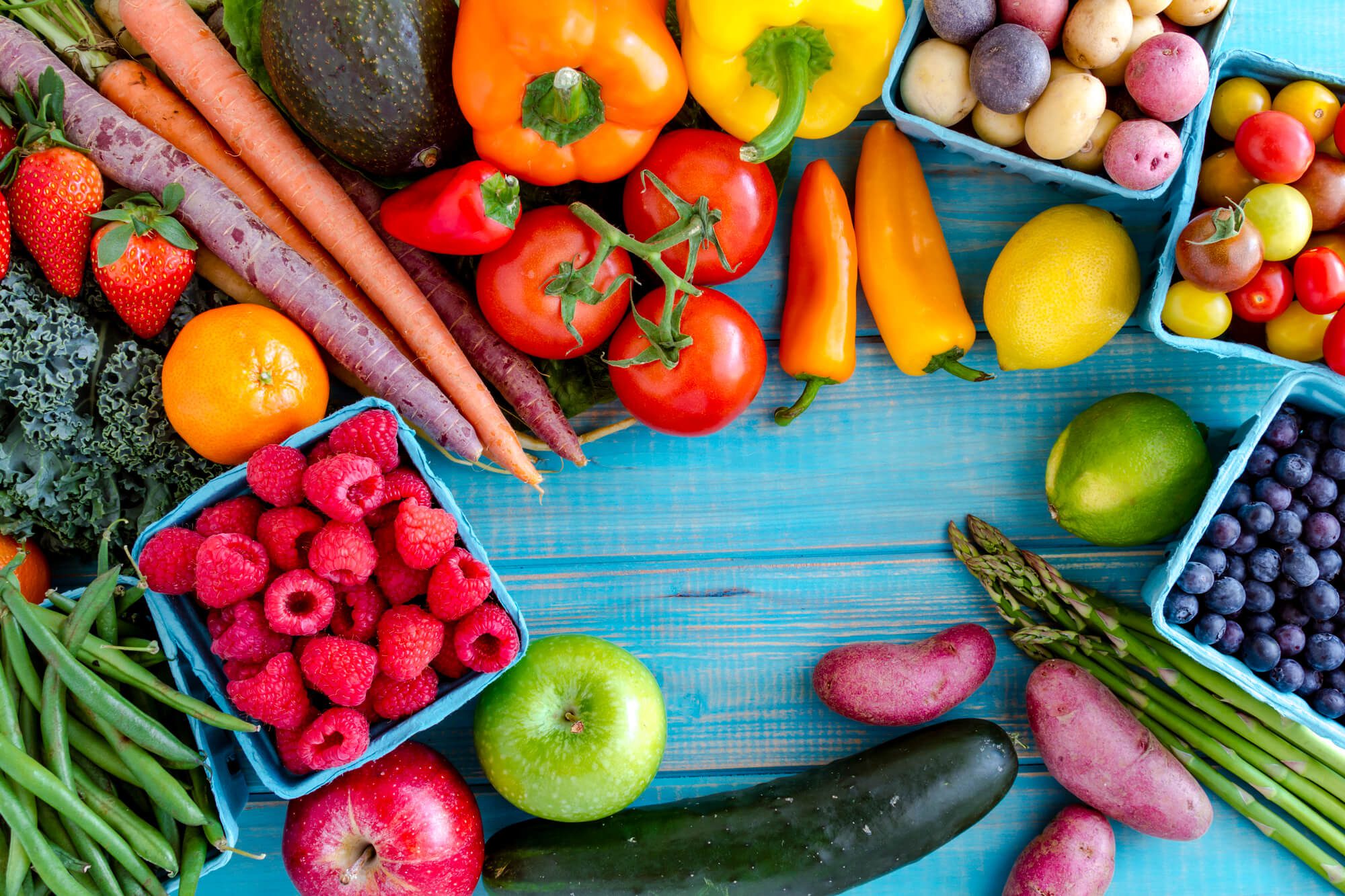Mouthwatering BBQ Sauces That Pair Perfectly with Vegan Proteins
Everything About Healthy Food: Advantages of Enjoying Plant Based Options
The conversation bordering plant-based diet plans has gotten substantial focus in current years. Numerous individuals are exploring the possible health and wellness benefits, nutritional advantages, and ecological influences related to these nutritional choices. As people come to be more knowledgeable about their food's impact on wellness and sustainability, questions emerge concerning the usefulness of adopting such a way of life. What specific changes can one anticipate, and how might these options improve not only individual wellness however likewise the planet's future?
Comprehending Plant-Based Diet Plans
Although many individuals link plant-based diets primarily with vegetarianism or veganism, these diet plans can encompass a large range of eating patterns that prioritize entire, minimally processed plant foods. Such diet regimens commonly include fruits, vegetables, entire grains, seeds, nuts, and vegetables, while removing or limiting pet items. This flexibility permits people to tailor their nutritional selections according to personal choices and dietary needs. Some might take on a mainly plant-based diet regimen while still periodically consuming meat or dairy, commonly referred to as a flexitarian method. The emphasis continues to be on including more plant foods, which can lead to a varied variety of dishes and flavors. Comprehending these different analyses of plant-based consuming is vital for valuing its accessibility and charm in modern food society.
Wellness Benefits of Plant-Based Foods
The health benefits of plant-based foods are considerable, using a nutrient thickness benefit that sustains total well-being. Research indicates that these foods can improve heart health and wellness and play a necessary duty in reliable weight monitoring. By including more plant-based options, individuals may enhance their nutritional selections and advertise lasting health and wellness.
Nutrient Density Benefit
Nutrient thickness plays a necessary duty in the wellness advantages of plant-based foods, making them an engaging option for those seeking a balanced diet. Plant-based foods, such as fruits, veggies, beans, nuts, and entire grains, are commonly abundant in necessary vitamins, minerals, and antioxidants while being lower in calories. This high nutrient density allows people to take in fewer calories while still meeting their dietary demands. Furthermore, these foods are packed with nutritional fiber, advertising digestion health and aiding in weight administration. By integrating nutrient-dense plant-based options, consumers can enhance their overall health, sustain their body immune systems, and minimize the threat of persistent illness. Ultimately, the nutrient thickness of plant-based foods emphasizes their value in a health-conscious lifestyle.
Heart Wellness Enhancement

Weight Monitoring Support
Along with advertising heart health and wellness, a plant-based diet plan can significantly aid in weight management. This dietary approach emphasizes entire foods such as fruits, vegetables, beans, nuts, and whole grains, which are usually lower in calories and greater in fiber compared to animal-based items. The high fiber content aids enhance satiation, minimizing overall calorie intake. Plant-based diet regimens are frequently abundant in important nutrients while reduced in unhealthy fats, making it simpler to keep a healthy weight. Research study shows that individuals who take on a plant-based lifestyle have a tendency to have reduced body mass indexes (BMIs) and experience even more successful weight management contrasted to those who take in meat-heavy diet regimens. Welcoming plant-based alternatives is a tactical option for efficient weight monitoring.
Nutritional Worth of Plant-Based Ingredients
Plant-based ingredients are rich in vital nutrients, supplying a varied array of vitamins, minerals, and antioxidants that add to overall health and wellness. A comparison of protein sources exposes that while animal products are typically checked out as premium, several plant-based choices give ample healthy protein and other useful substances. Comprehending the dietary worth of these active ingredients can aid individuals make notified nutritional selections.
Crucial Nutrients in Plants
Nutrient-rich active ingredients located in plants use a diverse range of important vitamins and minerals that contribute substantially to general health and wellness. These ingredients are abundant in vitamins A, C, and K, which sustain immune feature, vision, and blood clotting, respectively. On top of that, plants supply crucial minerals such as magnesium, calcium, and potassium, important for heart health and wellness, muscle feature, and bone stamina. The presence of fiber in plant-based foods help digestion and advertises a healthy and balanced gut microbiome. Anti-oxidants, discovered abundantly in fruits and vegetables, aid battle oxidative stress and lower inflammation. Numerous plant foods are reduced in calories yet high in nutrients, making them an outstanding selection for those seeking to keep a healthy weight while making certain perfect nutrient consumption.

Contrasting Healthy Protein Sources
Protein resources vary considerably in their dietary accounts, with plant-based ingredients using special advantages. Unlike animal healthy proteins, which commonly consist of hydrogenated fats and cholesterol, plant proteins tend to be reduced in these unhealthy components. Legumes, nuts, seeds, and entire grains are abundant in vital amino acids, fiber, vitamins, and minerals. As an example, lentils give high healthy protein material together with significant iron and folate, while quinoa is a full healthy protein, providing all nine crucial amino acids. Furthermore, plant-based proteins are commonly gone along with by go to website anti-oxidants and phytochemicals that support overall health and wellness. The shift to plant-based healthy protein sources not just enhances dietary intake yet likewise straightens with sustainable nutritional methods, reducing ecological influence and promoting lasting health and wellness advantages.
Environmental Influence of Plant-Based Eating
As recognition of climate adjustment grows, lots of individuals are checking out lasting dietary selections that can significantly reduce their environmental impact. Plant-based consuming has arised as a substantial factor to decreasing greenhouse gas exhausts, which are largely connected with animals production. The cultivation of fruits, beans, veggies, and grains commonly requires fewer resources, such as water and land, contrasted to pet farming. Additionally, plant-based diet plans can cause lowered deforestation, as less land is needed for grazing livestock or growing pet feed. By shifting towards plant-based choices, customers can sustain biodiversity and advertise much healthier communities. Generally, welcoming plant-based consuming not just advantages individual wellness yet also represents an important step toward environmental sustainability and conservation efforts.
Overcoming Common Misconceptions
While numerous individuals recognize the benefits of a plant-based diet, several misunderstandings typically prevent them from completely accepting this way of life. A common belief is that plant-based diets do not have enough healthy protein; nonetheless, many plant resources, such as beans, nuts, and tofu, offer ample protein. Additionally, some presume that this diet regimen is costly, when actually, staples like beans, rice, and seasonal vegetables can be quite affordable. One more misunderstanding is that plant-based eating is excessively limiting, whereas it really provides a diverse selection of flavors and foods. Numerous stress that a plant-based diet plan may lead to shortages, yet with proper preparation, individuals can get all needed nutrients, including minerals and vitamins, while delighting in a vast range of scrumptious meals. Vast Tips for Transitioning to a Plant-Based Way of life
Making the change to a plant-based way of life can be an enriching experience, though it commonly requires some support to navigate the preliminary adjustments. First, people are encouraged to begin progressively, integrating even more fruits, vegetables, vegetables, and entire grains into their dishes while lowering meat and dairy usage. Meal planning is crucial; preparing a weekly menu can assist reduce the change and stop final harmful choices. Exploring cooking methods and brand-new recipes can also preserve and boost the experience exhilaration about plant-based eating. Furthermore, signing up with support system or communities can provide motivation and share important ideas. Ultimately, remaining educated concerning nourishment warranties well balanced dishes, preventing deficiencies while fostering a healthy, satisfying plant-based lifestyle.
Delicious Plant-Based Dish Ideas
Checking out delicious plant-based meal concepts can inspire individuals to accept a much more nutritious diet plan. One preferred option is a hearty quinoa salad, including cherry tomatoes, cucumber, and a zesty lemon-tahini dressing. An additional favorite is a tasty lentil stew, loaded with carrots, celery, and fragrant herbs, best for a comforting dinner. For morning meal, over night oats made with almond milk, chia seeds, and topped with fresh berries offer a nourishing beginning to the day. Additionally, a dynamic veggie stir-fry with tofu and a selection of colorful veggies can be a quick yet pleasing dish. Lastly, luscious avocado toast on whole-grain bread, sprinkled with seeds and spices, offers a basic yet tasty snack. These dishes display the selection and richness of plant-based consuming.

Frequently Asked Questions
Can a Plant-Based Diet Provide Enough Protein?
The question of whether a plant-based diet plan can give sufficient healthy protein prevails. Many resources, consisting of beans, nuts, seeds, and entire grains, can satisfy healthy protein requires successfully, sustaining a balanced and nutritious diet regimen for individuals.
Are Plant-Based Diets Ideal for Kid?
The viability of plant-based diets for youngsters depends upon careful planning. Adequate nutrients need to site link be guaranteed, consisting of minerals, healthy proteins, and vitamins. With correct guidance, such diet plans can sustain healthy development and development in kids.
How Do I Eat Out on a Plant-Based Diet?
Eating out on a plant-based diet includes looking for restaurants with varied menus, requesting alterations, and checking out vegan-friendly options. Preparation ahead and interacting nutritional preferences can boost the dining experience while keeping nutritional choices.
What Are Usual Irritants in Plant-Based Foods?
Typical irritants in plant-based foods include soy, gluten, nuts, and seeds - Plant Based Beef. Individuals complying with a plant-based diet regimen ought to recognize these allergens and read labels very carefully to prevent adverse reactions and guarantee secure intake
Can Plant-Based Diets Aid With Weight Management?
Research indicates that taking on a plant-based diet plan may More Help help with weight reduction because of its typically lower calorie thickness and higher fiber material. This combination can improve satiety, assisting individuals manage their calorie consumption properly. Several individuals link plant-based diet regimens mainly with vegetarianism or veganism, these diets can encompass a wide range of eating patterns that focus on whole, minimally processed plant foods. Nutrient density plays a vital function in the health benefits of plant-based foods, making them a compelling choice for those seeking a well balanced diet regimen. Plant-based diet regimens have actually been shown to markedly enhance heart health, as they often have elements that support cardio feature. In addition to promoting heart health, a plant-based diet can significantly help in weight administration. A common idea is that plant-based diet plans lack adequate protein; nonetheless, many plant sources, such as vegetables, nuts, and tofu, supply adequate protein.